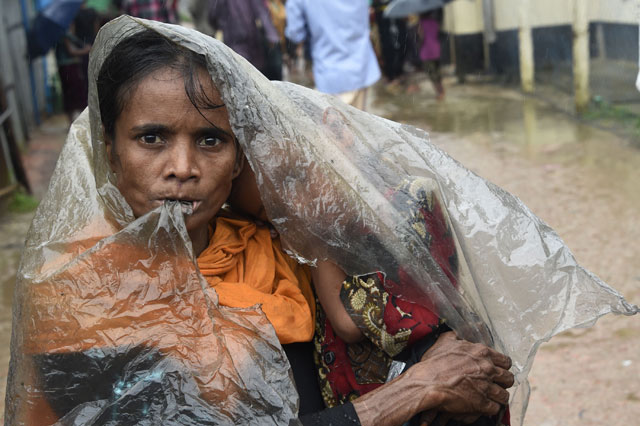NAYPYITAW — Myanmar leader Aung San Suu Kyi on Tuesday condemned human rights violations in Rakhine state and said violators would be punished, but she did not address UN accusations of a campaign of ethnic cleansing by the military.
The Nobel Peace laureate's remarks came in her first address to the nation since attacks by Rohingya Muslim insurgents on August 25 sparked a military response that has forced 421,000 Rohingya Muslims into neighbouring Bangladesh.
Western diplomats and aid officials, hoping for an unequivocal condemnation of violence and hate speech, welcomed the tone of Suu Kyi's message, but some doubted if she had done enough to deflect global criticism.
At the annual UN General Assembly, UN Secretary General Antonio Guterres, gave a cautious response and repeated a call for authorities to end military operations and allow humanitarian access.
"I take note of State Councilor Aung San Suu Kyi's address today and their intention to implement the recommendations of the advisory committee for Rakhine state, that was chaired by Kofi Annan, within the shortest time possible.
"But let me emphasise again, the authorities in Myanmar must end the military operations, allow unhindered humanitarian access and recognize the right of refugees to return in safety and dignity; and they must also address the grievances of the Rohingya, whose status has been left unresolved for far too long."
Human rights group Amnesty International described Suu Kyi's speech as "little more than a mix of untruths and victim-blaming", saying she and her government were "burying their heads in the sand" for ignoring the army's role in the violence.
"We condemn all human rights violations and unlawful violence. We are committed to the restoration of peace and stability and rule of law throughout the state," Suu Kyi said in her address in the capital, Naypyitaw.
"Action will be taken against all people, regardless of their religion, race and political position, who go against the law of the land and violate human rights," she said.
Long feted in the West as a champion of democracy in the Buddhist-majority country during years of military rule and house arrest, Suu Kyi has faced growing criticism for saying little about abuses faced by the Rohingya.
The United States urged Myanmar on Monday to end military operations, grant humanitarian access, and commit to aiding the safe return of civilians to their homes.
Myanmar's generals remain in full charge of security and Suu Kyi did not comment on the military or its actions, except to say there had been "no armed clashes and there have been no clearance operations" since September 5.
Rohingya refugees arriving in Bangladesh have told of soldiers and Buddhist civilians attacking and burning villages as recently as last Friday. It was not possible to verify their accounts.
Burning villages
Rights monitors and fleeing Rohingya say the army and Rakhine Buddhist vigilantes have mounted a campaign of arson aimed at driving out the Muslim population. The UN rights agency said it was "a textbook example of ethnic cleansing".
Myanmar rejects that, saying its forces are tackling insurgents of the Arakan Rohingya Salvation Army, which has claimed responsibility for attacks since October. The government has declared it a terrorist group and accused it of setting the fires and attacking civilians.
Western governments that backed Suu Kyi's campaign against military rule still see her as the best hope for Myanmar's political and economic transition.
But she has to avoid angering the powerful army.
She also has to avoid alienating her supporters by being seen to take the side of a Muslim minority that enjoys little sympathy in a country that has seen a surge of Buddhist nationalism.
Some diplomats said she had not squarely addressed the problem of violence in her speech.
But her domestic audience was happy.
Thousands of supporters cheered and let balloons float into the sky in the main city of Yangon as they watched her speech on a big screen. Social media saw a blizzard of posts with the message: "We stand with Aung San Suu Kyi".
The military's spokesman was not available for comment. One official familiar with the military's thinking said it would have no objection to her speech.
Phil Robertson of Human Rights Watch said satellite images showed about half of all Rohingya villages had been torched and it was time that Suu Kyi, the government and military faced the fact that the security forces "shoot and kill who they want" and burn villages.
Amnesty International said there was "overwhelming evidence" the security forces were engaged in ethnic cleansing.
"While it was positive to hear Aung San Suu Kyi condemn human rights violations in Rakhine state, she is still silent about the role of the security forces," the group said.
